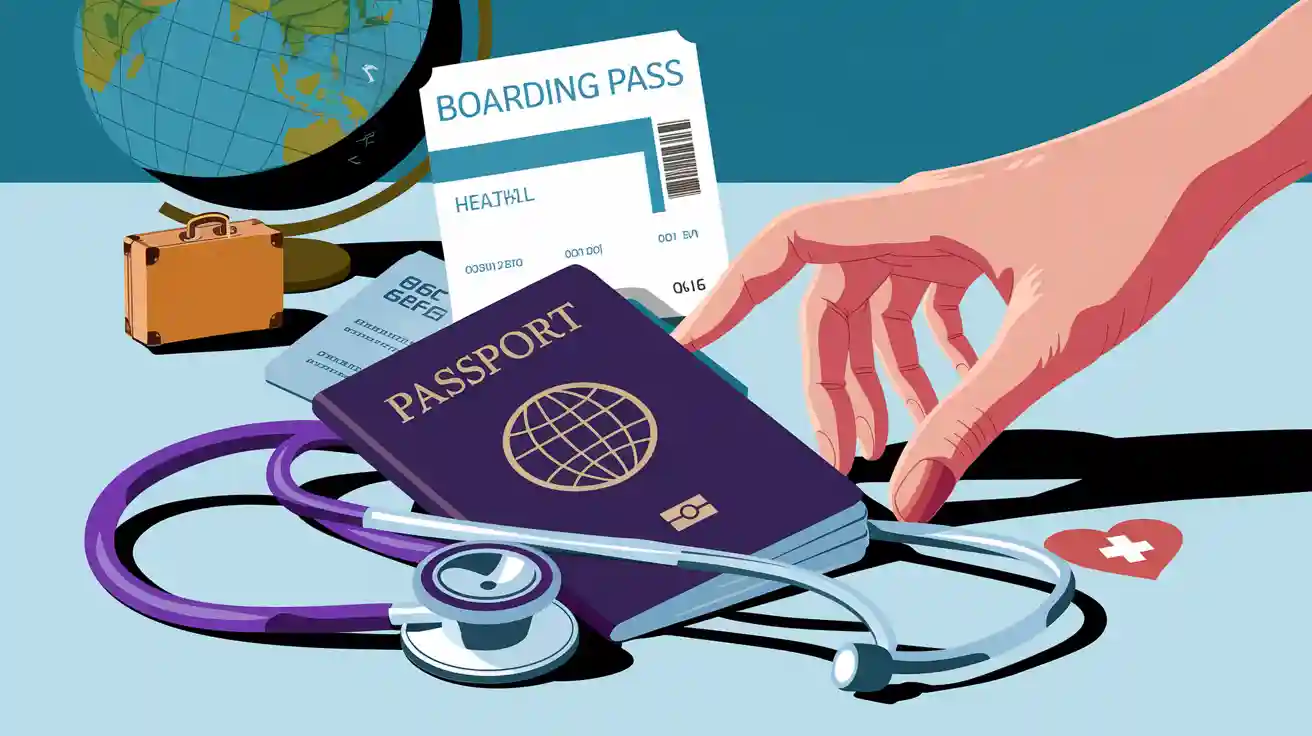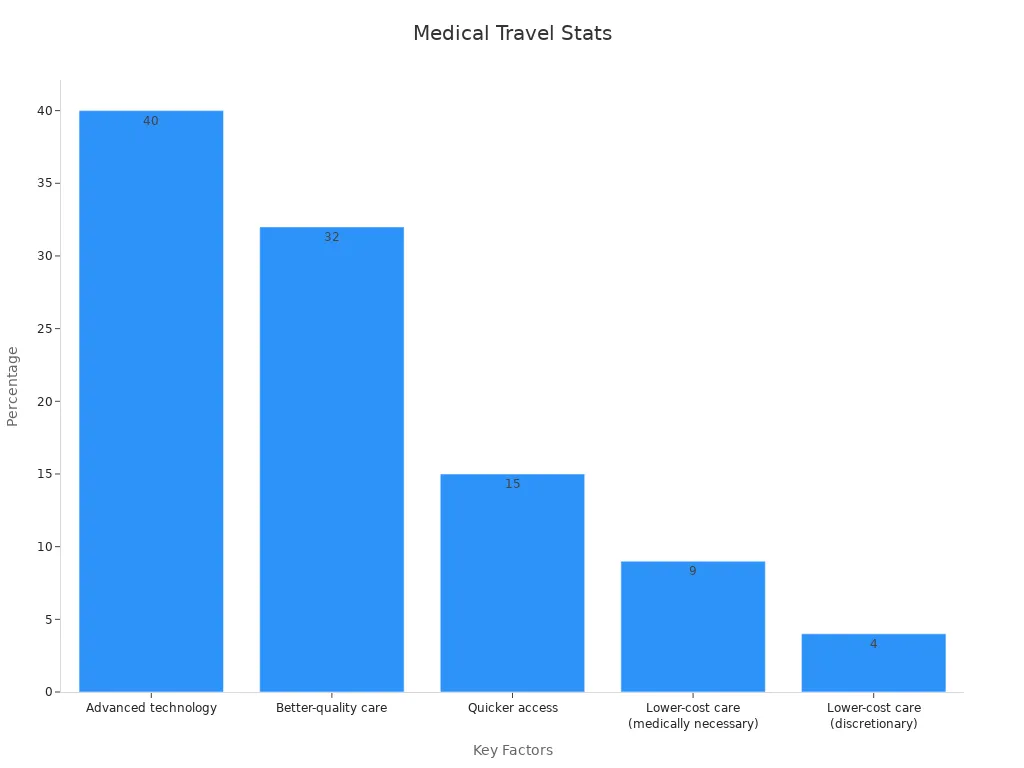What happens when you choose medical treatment in another country

Imagine you need quick medical treatment in another country. You may feel worried. Medical tourism lets you get good care fast. It also costs less for medical treatment. Many people pick health tourism every year. Global medical tourism made $24 billion in 2009. It grew to almost $28 billion in 2022. Governments in top places spend money on healthcare. They want to bring in patients from other countries. When you plan your medical trip, you must prepare. Insurance is also important. Picking a trusted provider like TMTC keeps you safe. You will get good medical treatment in another country.
Key Takeaways
Medical tourism lets you get care in another country. It is often faster and costs less money. You can still get good care.
Pick a provider you trust. Make sure they have good training. They should talk clearly and help you any time. This keeps you safe.
Get ready by planning your travel. Buy insurance and gather all needed papers before you go.
Learn who to call in an emergency. Know what to do if you need help during your treatment.
Services like TMTC give you more help. You get insurance after surgery. Your trip will be smooth and less stressful.
Medical Treatment Abroad: The Process
Deciding on Medical Tourism
You might ask why people pick medical tourism. Many families want better care, faster help, or lower prices. A survey of UAE families showed these are common reasons. The survey talked to 336 families. It looked at why they left home for care and what made them pick certain places. People want good care, short waits, and low costs. These reasons help governments and providers know what you want when you think about health tourism.
If you think about medical travel, you are not alone. For example, 51 people from the UK went for fertility treatment. Fourteen Canadians traveled for hip or knee surgery. In the Maldives, 815 people shared their medical travel stories. Most, about 90%, were happy with their last treatment. Many also care about getting follow-up care. About 87.5% said this is important. These facts show medical tourism is popular and trusted.
Choosing a Provider
Picking the right provider is very important. You should look for providers with good qualifications. Patients often check for licenses and certifications. You also need to see if your insurance works with the provider. Other things to think about are:
How long you wait for an appointment
Where the provider is located
How much it costs and what you pay yourself
Online reviews and what friends or family say
If you used the provider before
If you get clear and quick information
You need good details to make a smart choice. TMTC is a top medical tourism provider. TMTC connects you with doctors who follow UK and NHS rules. You get help any time, day or night, from a special team. This support helps you feel safe and sure during your trip.
Booking and Coordination
Booking and planning are big parts of medical travel. You want everything to go smoothly. Many people pick medical tourism because of new technology, better care, and quick service. A survey of almost 50,000 patients showed 40% wanted new technology, 32% wanted better care, and 15% wanted faster help. Lower prices also matter. Nine percent needed care, and 4% wanted extra procedures.

TMTC makes booking simple. You start with a UK consultation. TMTC sets up your surgery in India at a top hospital. You get private rides, visa help, and a nice recovery room. The team helps you all day and night. TMTC also gives you a 12-month insurance plan for care in the UK after surgery. This insurance helps you feel safe after your treatment.
Here is a table that shows what good booking and planning can include:
Service Feature | Description |
|---|---|
Travel arrangements | Flights, airport pick-up, local transport |
Hotel recommendations | Comfortable stays near hospitals |
Hospital ancillary services | Help with paperwork and hospital needs |
Tour scheduling | Activities for recovery and relaxation |
Insurance coordination | Making sure your coverage is in place |
24/7 assistance team | Support any time, day or night |
Tip: Always pick a provider with a team that helps 24/7. This team can answer your questions, fix problems, and help you feel safe during your trip.
TMTC’s easy process gives you fast booking, a nice recovery, and full insurance. You get help from a team any time and enjoy a worry-free medical trip.
Medical Emergencies While Abroad
Who to Contact
If you have a medical emergency while traveling, you must know who to call first. Call the local emergency number right away for help. Many countries have a special number for an ambulance or police. If you are on a plane, flight attendants are your main helpers. They talk to medical companies on the ground for advice. These companies tell the crew and any doctors or nurses what to do. Some airlines let medical helpers talk to doctors on the ground. Other airlines use flight attendants to share messages. When everyone knows their job and talks clearly, help comes fast in an emergency.
Accessing Emergency Care
You should know what to do to get emergency care in another country. First, call the local emergency number or go to the closest hospital. Hospitals in many places have plans for emergencies. They check how sick you are and give you the right care. If you travel with TMTC, you get extra help. TMTC gives support all day and night and helps you find a good hospital fast. In big emergencies like Ebola and COVID-19, hospitals used strong safety steps. These steps included finding sick people early, keeping them apart, and keeping workers safe. The table below shows how different places handled big emergencies:
Emergency Event | Location & Dates | Cases & Deaths | Key Procedures | Success Indicators |
|---|---|---|---|---|
Ebola (DRC) | NE DRC, Uganda, 2019-2020 | Vaccination, screening, health worker safety | Outbreak contained | |
Ebola (West Africa) | Guinea, Liberia, Nigeria, Sierra Leone, 2014-2016 | 1711 cases, 932 deaths | Emergency centers, safe burials, travel rules | Outbreak stopped |
COVID-19 | China & worldwide, 2020 | 7794 cases, 170 deaths | Early detection, isolation, contact tracing | Slowed virus spread |
These stories show that good teamwork and strong plans can save lives during emergencies in other countries.
Notifying Your Insurance
You need to tell your insurance company about the emergency as soon as you can. This helps you get help and makes sure your care is paid for. Here is what you should do:
Call or message your insurance company right away.
Give your policy number and ID to the hospital or insurance.
The hospital will ask your insurance for approval.
Follow what your insurance company tells you to do.
Keep all your medical papers and bills safe.
Tip: Always carry your insurance card and keep your contact details up to date when you travel for medical care.
Talking clearly with your insurance company helps you get the help you need. It also makes sure you do not have problems with payment or coverage while you are away.
Minor Illnesses and Routine Care
Finding Clinics and Pharmacies
If you travel for medical care, you might get a cold or stomach bug. You may also need to get more medicine. Big hospitals and special centers get most of the attention in popular places. Local clinics and pharmacies are there too, but they are not always the same. Some are better than others. Here are some things to remember:
Hospitals in places like Jamaica and Southeast Asia often have international accreditation. This means they meet high standards.
Local clinics and pharmacies may not be as well known or have as much money as big hospitals.
Some private clinics try to get patients from other countries, but not all can improve their buildings or tools.
Most foreign money goes to hospitals, not small clinics or pharmacies.
Pharmacies may have many medicines, but the brands and boxes might look different from home.
Tip: Always check if a clinic or pharmacy is connected to a hospital with international accreditation. This can help you feel sure about the care you get.
Local Healthcare Procedures
You should know how healthcare works in the country you visit. The CDC Yellow Book gives travelers good tips for finding care in other countries. You can use it to learn how to find good doctors and clinics. Many countries now have telemedicine. This lets you talk to a doctor online. Sometimes you talk live, and sometimes you send messages and wait.
Before you go, ask your doctor at home about telemedicine choices.
Learn how to take clear photos of any health problems, like rashes or cuts. Good light and different angles help doctors see what is wrong.
Always follow the local rules and privacy laws when you use telemedicine.
A table can help you remember what to do if you need regular care:
Step | What to Do |
|---|---|
Find a clinic | Ask your provider or hotel for recommendations |
Visit a pharmacy | Bring your prescription and ID |
Use telemedicine | Check if your insurance covers it |
Keep records | Save all receipts and medical notes |
You can handle small health problems if you know what to expect and get ready before your trip.
Travel Insurance and Documentation
Ensuring Coverage
When you get ready for medical tourism, think about travel insurance. Travel insurance helps pay if you get sick or hurt in another country. Many people pick health tourism for safe and cheap care. You must check that your travel insurance covers everything you need. Insurance helps you feel calm and safe when you travel for medical tourism.
Studies show travel insurance makes people feel safe. It also makes them spend more on medical tourism. Insurance lowers risk and helps you feel sure about your trip. The table below shows how insurance helps with travel and medical tourism:
Evidence Aspect | Description |
|---|---|
Insurance helps you feel safe and ready for medical tourism | |
Spending Increase | People with insurance spend more on health tourism and medical tourism |
Risk Reduction | Insurance lowers the risk of high medical bills during medical tourism |
Confidence Boost | Insurance makes you more likely to choose medical tourism |
Always buy travel insurance before you go. This helps you avoid trouble if you need care during your medical tourism trip.
Required Documents
You need to bring the right papers for medical tourism. These papers help you get care and use your travel insurance. Here is what you should bring:
Passport and visa
Travel insurance policy and card
Medical records and doctor’s notes
List of medicines you take
Emergency contact details
Proof of payment for your medical tourism package
Tip: Save copies of your papers on your phone and email. This helps if you lose the real ones during your health tourism trip.
TMTC’s Post-Surgery Insurance
TMTC gives a special 12-month post-surgery insurance for medical tourism. This insurance helps you after your treatment. You get care for any problems after surgery. TMTC’s insurance pays for follow-up care at private UK hospitals. You do not pay extra for this service. The insurance covers:
Complications after surgery
Follow-up visits and care in the UK
Emergency treatment if needed
You get full help from TMTC’s team. They help you use your insurance and answer your questions. This makes your medical tourism trip safe and simple.
Preparing for Medical Treatment Abroad
Saving Emergency Contacts
You should save important emergency contacts before you travel. Getting help fast can really help if something bad happens. Studies show that quick help makes emergencies safer for patients. You need to keep a list of important numbers on your phone and on paper. These contacts help you get help when you need it most.
Embassy or consulate contact
24-hour travel insurance hotline
TMTC assistance team number
Tip: Put these numbers in your phone favorites and keep a paper copy in your wallet. This easy step helps you get help fast if you have an emergency.
Carrying Health Records
Always bring your health records when you travel for medical care. Doctors need your medical history to keep you safe. Research shows that having your records stops mistakes and saves time. The World Health Organization says sharing information keeps you safer. You can bring paper copies or save files on your phone or a USB drive.
A table can help you remember what to pack:
Health Record Item | Why It Matters |
|---|---|
Medical history summary | Helps doctors understand your needs |
Medication list | Prevents harmful drug interactions |
Allergy information | Avoids dangerous reactions |
Recent test results | Saves time and avoids repeat tests |
Packing Essentials
Packing the right things helps you feel ready for your treatment. Bring all your medicines, prescriptions, and any medical devices you use. Wear loose, comfy clothes to make recovery easier. Small hygiene items help you stay clean. You might want to pack things for comfort, like a neck pillow, slippers, or a favorite book. Fun things like music or puzzles can help you relax while you recover.
All medications and prescriptions
Copies of your health records
Comfortable clothing for recovery
Hygiene products (toothbrush, wipes, sanitizer)
Comfort items (neck pillow, slippers)
Entertainment (books, headphones)
Note: Packing carefully helps you focus on getting better and makes your trip easier. TMTC’s team can help you if you have questions about what to bring.
When you pick medical tourism, you do things to stay safe. You get your papers ready and check your insurance. You also choose a provider you trust. TMTC helps you and gives you clear facts at each step. Experts say planning and picking the right provider help you get better care.
Less than 1 out of 10 travelers buy special insurance for medical tourism, but 1 out of 3 have no insurance. This shows that not being ready can be risky.
85% of patients are happy with their medical tourism because of good care and skilled workers.
90% would travel again for medical tourism and tell others to try it, and 84% go back to the same provider.
Most people do not need more treatment after they go home, and 70% get follow-up care.
You can get safe, low-cost, and good care with medical tourism. Learn as much as you can, plan before you go, and pick a provider who helps you before, during, and after your trip.
FAQ
What is medical tourism?
Medical tourism is when you go to another country for care. You might need surgery, dental work, or other treatments. People pick medical tourism for faster help or lower prices. Some want special care they cannot get at home.
What should you expect during a medical tourism trip?
You will follow a plan for your trip. First, you have a consultation. Then you travel for your treatment. Providers like TMTC help with booking and travel. They also help after your treatment. You may get a nice place to recover and a team to guide you.
What documents do you need for medical tourism?
You must bring your passport and visa. You also need your medical records and travel insurance. Make a list of your medicines and emergency contacts. Providers often give you a checklist to use. Keep copies of your papers on your phone and in your bag.
What are the benefits of medical tourism?
Medical tourism lets you get good care and short wait times. It can cost less money. You can rest in comfort after treatment. Many providers give extra help, like private rides and aftercare. You can pick from many treatment choices.
What makes TMTC different in medical tourism?
TMTC gives you a full package for medical tourism. You get to talk to UK doctors and have surgery in India. You also get luxury care after surgery. TMTC gives you a 12-month insurance plan after surgery. The team helps you before, during, and after your trip.
Tip: Always ask your provider what is in your medical tourism package. This helps you know what to expect and plan well.
See Also
Is It Legal To Bypass NHS Waiting Lists Today
How Your Area Influences IVF Waiting Periods On NHS
Effective Ways To Speed Up NHS Healthcare Access

